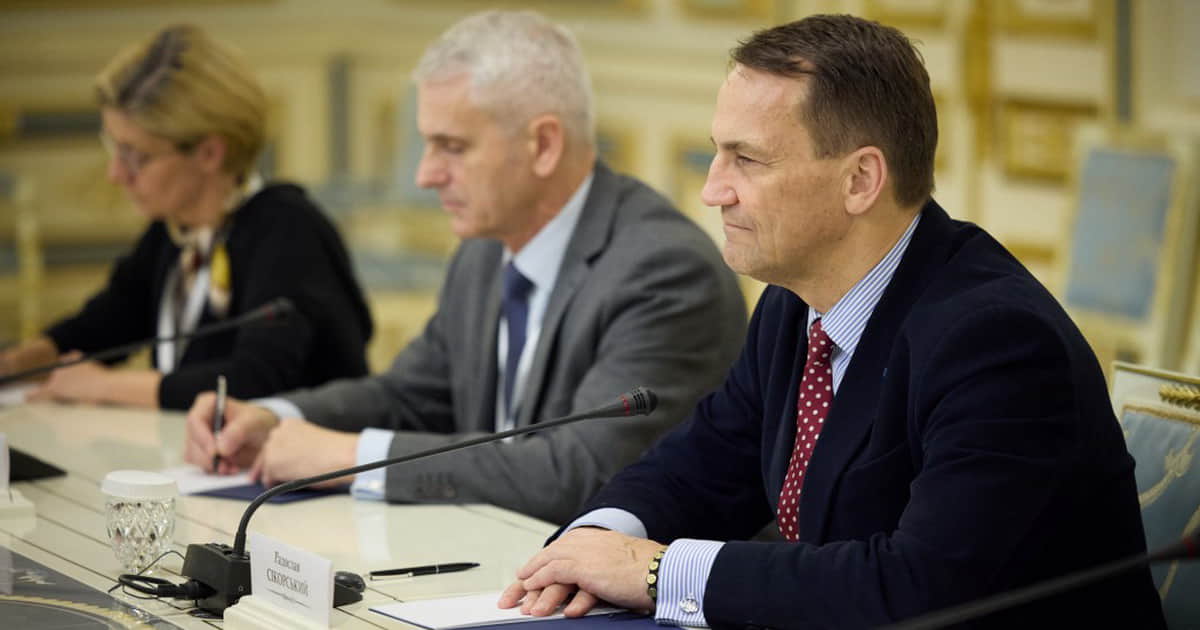The reason of conflict with Polish Foreign Minister in Kyiv and why it's no coincidence

Poland no longer unconditionally supports Ukraine as it did at the beginning of Russia's full-scale invasion. Now, Warsaw expects certain concessions in response to assistance to Kyiv. These conclusions can be drawn from a recent statement by Poland's Foreign Minister Radoslaw Sikorski.
He made this statement, answering a question about the conflict between Sikorski and Ukrainian President Volodymyr Zelenskyy on 13 September 13, when the Polish minister was paying a visit to Kyiv. Read more about the conflict and its meaning in the column by Yurii Panchenko, a European Pravda editor - Warsaw increases pressure: how relations between Ukraine and Poland have changed. Advertisement:
Panchenko reminds us that this conflict was reported by Polish media, particularly Witold Jurasz, a columnist and journalist of Poland's Onet. At the same time, Polish officials seemingly place the blame for this conflict on the Ukrainian president. "The conflict on 13 September is confirmed by sources at EuroPravda, but they place the blame on Sikorski," Panchenko states.
"Sikorski deliberately provoked us into conflict several times. In particular, he stated that Ukraine should not count on joining the EU any time soon. This process will take at least a decade," one high-ranking Ukrainian official told EuroPravda.
This Ukrainian government official believes that the Polish minister has changed his rhetoric so shraply because of Sikorski's ambitions to run for president in 2025. The author has grounds to believe that Radoslaw Sikorski will seek this nomination. "We can see, for instance, from his statements that, in the current challenging time with a war in Ukraine, Poland will need a strong and decisive president, hinting not at the mayor of Warsaw, Rafal Trzaskowski," notes Yurii Panchenko.
On the other hand, he points out that statements by a minister on such an important topic, which clearly contradict the government's position, are very uncharacteristic of Polish politics. "So, it's worth acknowledging something unpleasant: a tougher dialogue with Kyiv is the new course of the Polish government. And Radoslaw Sikorski just happened to be at the forefront of this course," warns the editor of European Pravda.
Supporting this version, the author adds, is another inside Onet report. According to their data, Poland plans to use its six-month presidency over the EU Council, starting in January 2025, to pressure Kyiv. "Sikorski urged Zelenskyy to resolve historical issues with Poland now, as he would pay a smaller price for them than during accession negotiations.
Zelenskyy did not take this onboard," Onet quotes an anonymous Polish diplomat. Panchenko notes that this correction in Warsaw's course is hardly unexpected. "It seems that the notion that Poland should receive more from Ukraine in exchange for its support has become so popular that it has been adopted by Prime Minister Tusk's party," suggests the columnist.
This strategy was recently called "hyena politics" by former Polish Foreign Minister Jacek Czaputowicz, but such views are clearly in the minority among Ukraine's neighbours. At the same time, the Polish government currently claims that the only area where they expect concessions from Ukraine is the lifting of the moratorium on search and exhumation work for the victims of the Volhynia tragedy. However, in this case, Warsaw seems to be knocking on an open door.
The issue of lifting the moratorium has long been resolved. Kyiv is ready to lift it as soon as Poland fulfils its commitments. "So, it is clear that the parade of demands on Ukraine is only beginning with the Volhynia issue, not ending with it," the editor concludes.
If you notice an error, select the required text and press Ctrl + Enter to report it to the editors.